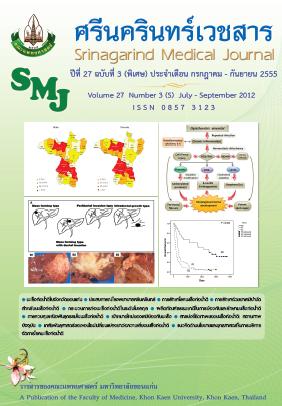Biomarkers in Bile Duct Cancers: Current Status
Keywords:
มะเร็งท่อน้ำดี, ตัวบ่งชี้ชีวภาพ, สารบ่งชี้มะเร็ง, cholangiocarcinoma, bile duct, tumor marker, serum markerAbstract
Although at present, there are several advancedtechniques for demonstrating cholangiocarcinoma (CCA),e.g., ultrasonography and CT scanning; cytology andbrushings done at the time of endoscopic retrogradecholangiography to demonstrate the present of tumorcells in bile; and fine needle aspiration to establishtumors. However, these techniques establish the diagnosisof CCA in only a minority of patients due to the cost andrisk from taking samples. Therefore, the availability ofa formal proof of malignancy such as serum markers isstill a constant goal in the diagnosis of CCA. There area number of biomarkers in serum for demonstrating CCAwhich can also be used as markers for monitoring, prognosisand recurrence of cancer. Each biomarker provides differentdiagnostic values based on the composition of the controlgroup used in the study. Since the risk and etiology ofCCA in Thai patients are different from other countries, theappropriate biomarker for CCA in Thai patients should beconsidered using the Thai cohort, of which patients withbenign biliary diseases and liver fluke infection personswere included as the control group, e.g., MUC5AC andCA-S121. Using combination of biomarkers together withother investigations will increase the power and accuracy ofCCA diagnosis. The appropriate sample collection, storageand the quality control of the tests are also important forusing biomarkers to differentiate CCA.
Keywords : cholangiocarcinoma, bile duct, tumor marker,serum marker




